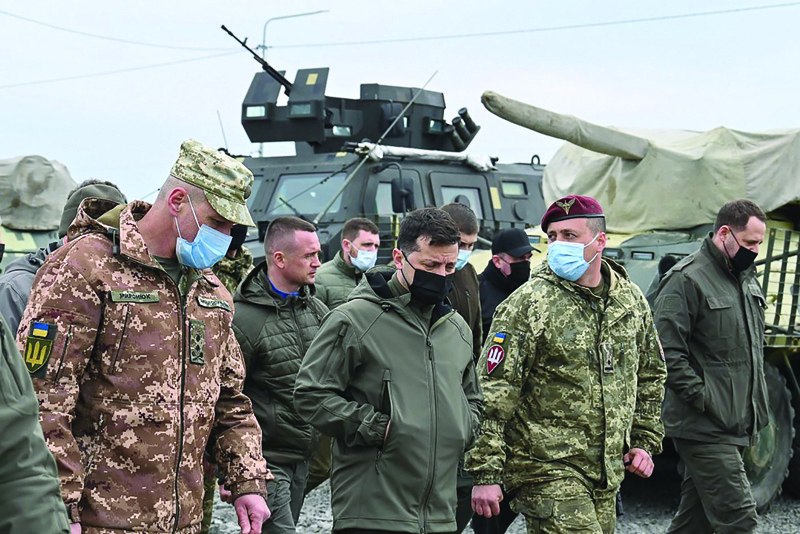 KHERSON, Ukraine : This file picture shows Ukraine's President Volodymyr Zelensky (center) speaking with servicemen during his visit of Ukrainian army's outposts in the Kherson region, on the administrative border with Russia-annexed Crimea. - AFP
KHERSON, Ukraine : This file picture shows Ukraine's President Volodymyr Zelensky (center) speaking with servicemen during his visit of Ukrainian army's outposts in the Kherson region, on the administrative border with Russia-annexed Crimea. - AFP
WASHINGTON: US Secretary of State Antony Blinken will visit Ukraine next week in a show of "unwavering" support after Russian troops amassed on its border, the State Department said Friday. Russia in recent weeks deployed up to 100,000 troops near Ukraine's northern and eastern borders as well as in Crimea, which Moscow seized in 2014, raising concerns of a major escalation.
Moscow announced on April 23 that it had started withdrawing its forces, bringing at least momentary relief in Kiev. Blinken's visit Wednesday and Thursday is intended "to reaffirm unwavering US support for Ukraine's sovereignty and territorial integrity in the face of Russia's ongoing aggression," State Department spokesman Ned Price said in a statement.
Blinken will meet Ukraine's President Volodymyr Zelensky and also push for action against corruption, a longstanding demand by Western partners of Ukraine, Price said. Philip Reeker, the top US diplomat for Europe, was cautious on judging Russia's intentions, telling reporters that the United States will "monitor that situation very closely."
"We have made very clear in our engagement with the Russian government that they should refrain from escalatory actions and aggressive activity," Reeker said, also renewing concern about ongoing Russian exercises in the Black Sea. Blinken's trip comes as President Joe Biden ramps up pressure on Russia but also prepares for a summit he has proposed with his counterpart Vladimir Putin in hopes of stabilizing the relationship.
"This is the old-fashioned business of secretaries of state, going places to have photo-ops to say, yes, the United States is interested in you and supports the government in charge on various policy issues," said Yuval Weber, an expert on Russia and Eurasia at the Wilson Center's Kennan Institute and Texas A&M's Bush School of Government and Public Service in Washington. Weber said that Russia's recent show of force was intended to send a message to the new Biden administration-and will keep Ukraine on edge.
While Russia pulled back troops after its exercises, it left defense equipment in the border regions, in what Weber said was a clear parallel to Moscow's preparations before its offensive with Georgia in 2008. "The troop buildup has been to some extent normalized, so the next time there is a troop buildup it will be a little less surprising," Weber said. Russia has signaled "that we have great capabilities to do something in the future, and they can instill additional insecurity in the Ukrainian body politic and Ukrainian mind."
Focus on corruption
Zelensky has pointed to the Russian troop movements to ask for a fast-track into NATO membership, a prospect opposed by Western Europeans concerned about Russia's response and which has met a cool reception in Washington. More than 13,000 people have died in Ukraine since 2014 in the only active fighting on European soil as Kiev battles pro-Russian separatists in the eastern Donetsk and Lugansk regions. A ceasefire that took hold last July has been shredded, with clashes sharply increasing between Ukrainian forces and separatists since January.
Biden has already imposed sanctions and expelled Russian diplomats over Russia's alleged election interference, hacking and treatment of ailing dissident Alexei Navalny, a hardening of resolve after former president Donald Trump voiced admiration for Putin and conspiracy theories about Ukraine. Trump's strong-arming of Zelensky to dig up dirt on Biden triggered his first impeachment and appears linked to an FBI raid Wednesday on the home of Trump's former personal lawyer, New York's ex-mayor, Rudy Giuliani.
The Biden administration has renewed pressure on Ukraine to root out corruption and improve governance. Carrying out reforms will be "key to securing Ukraine's democratic institutions, economic prosperity and Euro-Atlantic future," Price said. On the eve of announcing the trip, the State Department criticized Ukraine for removing the head of state energy company Naftogaz, saying the shakeup showed "disregard for fair and transparent corporate governance practices." - AFP




